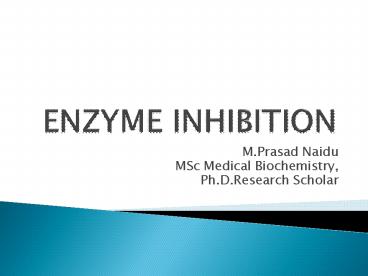Enzyme Inhibition - PowerPoint PPT Presentation
Title:
Enzyme Inhibition
Description:
Enzymology – PowerPoint PPT presentation
Number of Views:2295
Title: Enzyme Inhibition
1
ENZYME INHIBITION
- M.Prasad Naidu
- MSc Medical Biochemistry,
- Ph.D.Research Scholar
2
Enzyme Inhibition
- Definition
- Any substance that decreases the velocity of an
enzyme catalysed reaction. - Types of Inhibition
- 1. Competitive inhibition
- 2. Non competitive inhibition
- 3. Allosteric inhibition
- 4. Suicide inhibition
3
(No Transcript)
4
Malonate
5
Statins inhibit HMG CoA reductase
Statins
6
Methotrexate
- Folate reductase
- Folic acid Dihydrofolate
- O
- Dihydrofolate reductase
- Tetra hydrofolate
7
- Methotrexate analogue of FH2 inhibits DHFR
enzyme. Used in treatment of cancers. - Sulfonamide
- PABA analogue
- PABA required for folate production in bacteria
- Sulfonamide prevent bacterial folate synthesis
prevent growth of bacteria.
8
(No Transcript)
9
(No Transcript)
10
- Ethanol
- analogue of methanol, used for the treatment of
methanol intoxication. - CH3OH HCHO (formaldehyde)
- AD
- HCOOH (Formic acid)
- HCHO Causes retinal damage blindness
- HCOOH produces severe acidosis death
11
- CH3CH2OH CH3CHO CH3COOH
- NAD NADH
- CH3CHO Less toxic
- Ethanol competes for alcohol dehydrogenase
- prevents methanol toxicity.
12
(No Transcript)
13
- Non Competitive Inhibition (Irreversible
Inhibition) - 1.Heavy metals (mercury, lead, silver etc) bind
covalently to SH groups in the active site of
the enzyme. They bind irreversibly they are
highly toxic - E SH Hg2 ES --- Hg2 H
- Eg delta ALA Porphobilinogen
- ALA dehydratase Lead
- Proto porphyrin IX Heme
- Fe2
- Ferrochelatase - Lead
- 2. Cyto chrome C oxidase inhibited by cyanide
poisoning
14
(No Transcript)
15
- Allosteric Inhibition-
- 1.In glycolysis
- Hexokinase
- Glucose glucose-6phosphate
- ATP ADP
- Glucose-6phosphate acts as allosteric inhibitor
for hexokinase - Phospho fructo kinase
- 2.Fructose-6phosphate fructose-
1,6bisphosphate - ATP ADP
16
- ATP is negative allosteric modulator for PFK1
- 3. In TCA cycle
- ICD
- Isocitrate alpha ketoglutarate
- NAD NADH CO2
- ATP is negative allosteric modulator for ICD
17
- CO2
- 4. Acetyl CoA Malanoyl CoA
- Acetyl CoA carboxylase
- Palmitate
- Palmitate acts as negative allosteric modulator
for acetyl CoA caboxylase
18
(No Transcript)
19
(No Transcript)
20
Suicide inhibition It is a type of irreversible
inhibition. Also known as mechanism based
inactivation. Here , the structural analogue is
converted into a more effective inhibitor with
the help of the enzyme to be inhibted.
21
The substrate like compound initially binds with
the enzyme and the first few steps of the
pathway are catalysed. This new product
irreversibly binds to the enzyme and inhibits
further reactions.
22
Allopurinol
- Substrate analogue of Hypoxanthine
- 1.Hypoxanthine
- XO (xanthine oxidase)
- xanthine
- xanthine oxidase
- Uric acid
23
- Allopurinol
- xo
- xo
- Alloxanthine Uric acid
24
xanthine
oxidase inhibits 1. Allopurinol
alloxanthine 2.
5fluorouracil is used in the treatment of
cancer 5Fluorouracil 5fluoro-deoxyuridylate dUMP
TMP Thymidylate synthase
25
Regulation of Enzyme Activity
- Compartmentalization of Pathways
- Induction Repression of Enzymes
- Degradation of Enzymes
- Covalent Regulation
- Allosteric Regulation
- Iso enzymes
26
- Compartmentalization
- Enzymes for fatty acid synthesis are present in
cytosol - Enzymes for oxidation of fatty acids are present
in mitochondria.
27
- 2. Induction Repression
- Induction is increased synthesis of enzymes at
gene level through hormones or other substances. - Eg Insulin induces the synthesis of glucokinase
/glycogen synthase. - Repression is decreased synthesis of enzymes at
gene level. - Eg Ala synthase is repressed by heme.
28
(No Transcript)
29
- 3. Enzyme degradation
- The regulatory /key enzymes are degraded if not
needed and they are rapidly synthesized when
required. - Half lives of enzymes vary from one another.
30
- 4.Covalent Regulation
- 1.Irriversible by hydrolysis of chemical bonds -
proenzymes. - eg Inactive enzymes Active enzymes
- Zymogen / Proenzyme
- HCL
- Pepsinogen Pepsin
- 2. Reversible by phosphorylation and
dephospharylation of enzymes - eg Glycogen phosphorylase ( a b)
31
(No Transcript)
32
- 5. Allosteric Regulation

